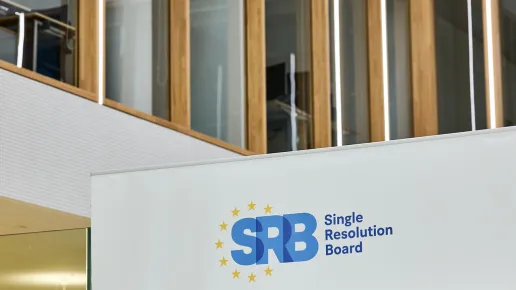SRB adopts resolution decisions for Slovenian and Croatian subsidiaries, decides no resolution action required for parent company in Austria.
- Today, the Single Resolution Board has decided to transfer all shares of the group’s Croatian subsidiary Sberbank d.d. to Hrvatska Poštanska Banka d.d. (Croatian Postbank) and all shares of the group’s Slovenian subsidiary Sberbank banka d.d. to Nova ljubljanska banka d.d. (NLB d.d.). The banks will open on Wednesday, 2 March, as normal with no disruption to depositors or clients. They are now part of well-established, robust and stable banking groups.
- The SRB has also decided that resolution is not necessary for the Austrian parent of Sberbank Europe AG. Insolvency procedures will be carried out according to national law. Eligible deposits up to €100,000 are protected by the Austrian deposit guarantee system.
The SRB determined on 27 February that Sberbank Europe AG in Austria and its subsidiaries in Croatia (Sberbank d.d.) and Slovenia (Sberbank banka d.d.) were failing or likely to fail due to a rapid deterioration in their liquidity situation, confirming the European Central Bank’s assessment. The SRB applied suspension of payments, enforcement and termination rights, known as a moratorium, to the three banks.
In close collaboration with the national resolution authorities, the SRB decided that no resolution action was necessary for the Austrian parent, Sberbank Europe AG and adopted resolution schemes for its subsidiaries in Croatia (Sberbank d.d.) and Slovenia (Sberbank banka d.d.). The European Commission has endorsed the two resolution decisions and all three of the decisions will be implemented by the national resolution authorities, the Austrian Financial Market Authority, the Croatian National Bank and the Bank of Slovenia.
Speaking in Brussels, Chair of the SRB, Elke König, said ‘The three decisions taken today have one thing in common – protection. The decisions protect financial stability; and the decisions protect depositors up to an amount of €100,000 in Austria and with no limits in both Slovenia and Croatia. Today, we acted to protect the public interest and ensure financial stability. All of this has been done without having to use public funds, so not only are Sberbank’s customers protected, the taxpayer is too. This was a complex, cross-border group and there has been excellent cooperation between authorities at EU and national level, which is even more vital in these times.’
The SRB found that there was a public interest in resolving the two subsidiaries in order to protect financial stability and avoid disruption to the Croatian and Slovenian economies. In the case of the Austrian parent, the bank was not considered to provide critical functions to the economy and that winding it up under normal insolvency proceedings would not have a negative impact on financial stability or the economy in Austria.
These resolution actions were possible because of the EU’s bank resolution framework, a set of rules put in place after the 2008/2009 financial crisis.
- Summary of the SRB decision in relation to Sberbank Europe AG (in Croatian, in Czech, in German, in Hungarian, in Slovenian)
- Summary of the SRB decision in relation to Sberbank d.d.
- Summary of the SRB decision in relation to Sberbank banka d.d.
- Factsheet (Croatian, Czech, German, Hungarian, Slovenian)
- Austrian Financial Market Authority press release
- Croatian National Bank press release
- Bank of Slovenia press release
- Czech National Bank press release
- Central Bank of Hungary national resolution authority press release
- European Commission press release
More information:
- Public Interest Assessment: SRB approach
- Critical Functions: SRB approach
- Directive 2014/59/EU of the European Parliament and of the Council of 15 May 2014 establishing a framework for the recovery and resolution of credit institutions and investment firms and amending Council Directive 82/891/EEC, and Directives 2001/24/EC, 2002/47/EC, 2004/25/EC, 2005/56/EC, 2007/36/EC, 2011/35/EU, 2012/30/EU and 2013/36/EU, and Regulations (EU) No 1093/2010 and (EU) No 648/2012, of the European Parliament and of the Council.
- Regulation (EU) No 806/2014 of the European Parliament and of the Council of 15 July 2014 establishing uniform rules and a uniform procedure for the resolution of credit institutions and certain investment firms in the framework of a Single Resolution Mechanism and a Single Resolution Fund and amending Regulation (EU) No 1093/2010.
- Directive 2014/49/EU of the European Parliament and of the Council of 16 April 2014 on deposit guarantee schemes.
Media contact details for national resolution authorities:
- Austrian national resolution authority, Financial Market Authority: Klaus Grubelnik, email klaus.grubelnik [a] fma.gv.at (klaus[dot]grubelnik[at]fma[dot]gv[dot]at), tel (+43-1) 249 59 6006
- Croatian national resolution authority, Croatian National Bank: email press [a] hnb.hr (press[at]hnb[dot]hr); tel (+385) 1 4565 006
- Slovenian national resolution authority, Bank of Slovenia: pr [a] bsi.si (pr@)pr [a] bsi.si (bsi.si); tel (+386) 1 47 19 400, (+386) 1 47 19 122
-
Czech National Bank Communications Division: Markéta Fišerová; Petra Vodstrčilová email: media [a] cnb.cz (media[at]cnb[dot]cz) , tel: (+420) 224 412 013
Documents
Contact our communications team
Recent news

- Guidance is now aligned with the resolvability self-assessment requirements.
- Update does not introduce new deliverables, but an operational framework...

The Single Resolution Board is today able to announce that the Single Resolution Fund’s target level remains reached as of the end of 2025. “Therefore...



